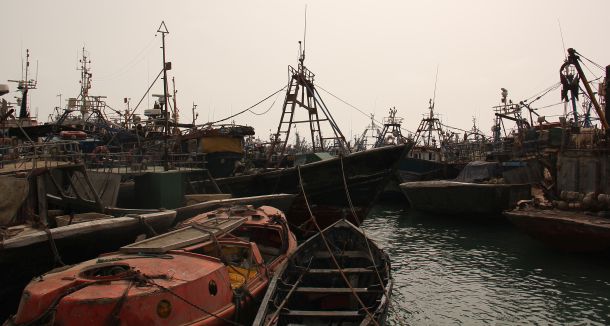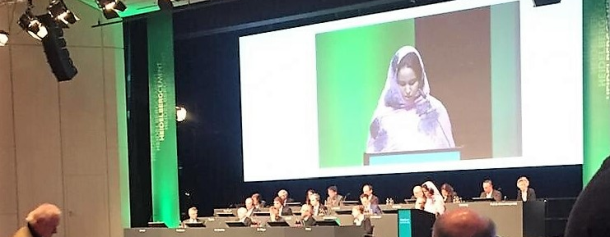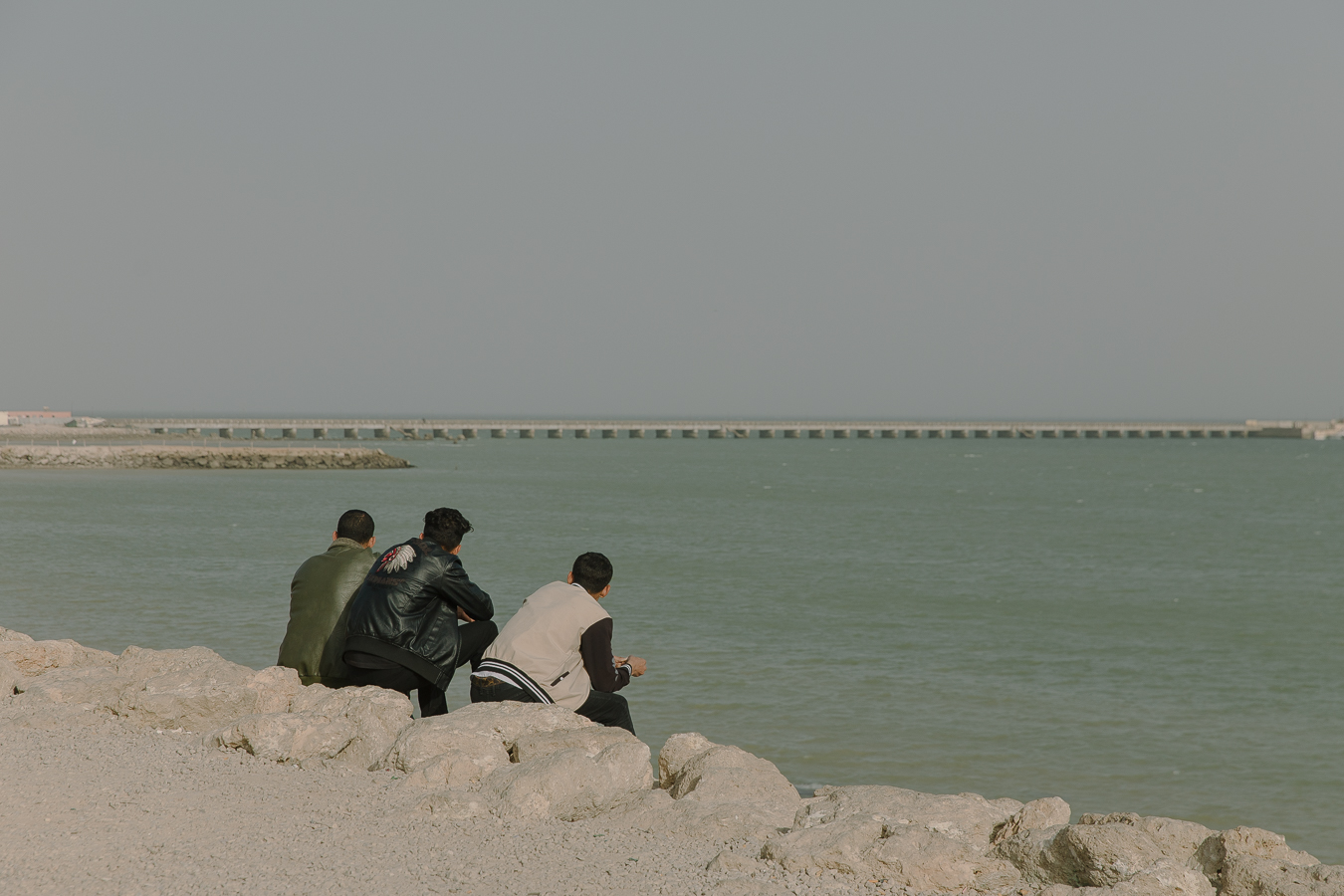
In order to increase the influx of Moroccan settlers and to ‘develop’ the territory, Morocco has rolled out large infrastructure works which the Saharawi people have never asked for.
The Saharawi people are today a minority in their own land, with many living as refugees abroad. Morocco's massive infrastructure development is not aimed at either of those two groups. The real purpose of its large-scale projects in Western Sahara is to facilitate further settlement of civilian Moroccans in the territory.
Energy imports
The occupation economy, large-scale Moroccan industries and armed forces are all depending on imports of energy. This mainly comes in two forms.
Petroleum products are imported primarily from refineries in Spain. According to WSRW's continuous monitoring, these products are transported to the ports of El Aaiún and Dakhla through approximately 160 shipments every year. WSRW has traced these shipments back to a handful of exporting harbours in Spain, mostly Carteya-Guadarranque near Gibraltar and Cartagena. The believed exporters are CEPSA and Repsol. The petroleum products are shipped on board an international fleet of tanker vessels, with a handful companies owning long-term transport contracts. Most involved is the French company Sogestran. In 2014 and 2017, WSRW published reports on the involvement of Wisby Tankers and the relevance of the petroleum imports to Morocco's hold on Western Sahara. In 2020, 2021, 2022, 2023 and 2024 WSRW published overviews on this particular trade.
Gas is imported in liquefied form; LPG. Most likely, the end-users are larger industries. WSRW published annual overviews of the gas imports into the territory in 2020, 2021, 2022, 2023 and in 2024. Historically, the gas has come from terminals in Spain. However, from the end of 2019, the Spanish exports seem to have been halted and largely replaced with exports from elsewhere. Exporters in Sweden and Norway have stated that they do not wish to take part in gas exports to Western Sahara. Incidents of gas exports have since 2020 been taking place mostly from France, UK, Netherlands, the US and Portugal.
Cement industry
There are currently three cement factories in occupied Western Sahara. Cement is naturally crucial for all construction of Moroccan government, military and civilian use. HeidelbergCement from Germany controls two of the factories – the CIMAR and the SIMSUD units – via its subsidiary Ciments du Maroc. The construction of the latter factory and its commissioning were concluded in 2019 by ThyssenKrupp.
In 2017, Swiss company Holcim (formerly LafargeHolcim) announced the finalisation of a 200,000 tonnes/year grinding unit in El Aaiún. The clinker for the industry is imported from Portugal.
Electricity
The most worrisome development relates to Morocco’s construction of windfarms and solar plants on occupied land. The most heavily involved company in the sector are Siemens Gamesa, Enel, Engie and General Electric. From 2021, French company VINCI was to construct a high voltage line that is crucial to connecting the local production to the grid in Morocco.
In addition, foreign companies have secured large contracts for electricity infrastructure, such as Larsen & Toubro near Dakhla. In 2014, WSRW wrote about a Saharawi family whose land was invaded for electricity infrastructure, constructed by Alstom (now General Electric). Finnish company Wärtsilä has won tenders for diesel generated power plants in Dakhla.
Transportation and communication
Large-scale overland transports of mostly fisheries products take place on often anonymous trucks that drive back and forth between the fisheries ports of Dakhla/El Aaiun on one side and ports in Morocco/Mauritania on the other.
Separate fleets of vessels are used for exporting different products, such as phosphates, sand, fishmeal and fish oil. In 2020, WSRW published a first study on the fleet transporting frozen fish from the waters offshore Western Sahara, as well as the fleets used for the imports of gas and petroleum products into the territory. In 2019, the French company CMA CGM opened up a line for container transport from Dakhla to Spain.
Very few airlines operate in the occupied territory. Most involved is the Moroccan state-owned airline Air Maroc. Also groups like Binter Canarias, Air Arabia, and KLM/Air France and its subsidiary Transavia have been involved over the last years.
In 2021 and 2024, the French company Alcatel Submarine Networks SpA, partially owned by Nokia, laid telecom cables from Dakhla. The preparatory seabed studies had been made by Dutch company Fugro.
Banking and insurance
A number of foreign banks have established operations in the occupied territory, predominantly of Moroccan and French ownership. Most of these openly claim that Western Sahara is part of Morocco. Western Union and DHL also have offices in the territory.
A type of insurance of particular importance relates to maritime traffic. The insurers of the phosphate vessels are referred to in our annual WSRW report phosphate series P for Plunder.
Tourism
Most players in the tourist sector are small-scale. The most concerning development relates to the kiting industry in the town of Dakhla, where backpackers, kiters and surfers from all over the world take part in a growing industry that ‘normalises’ the illegal occupation. Some kiting websites announce ’Dakhla, Morocco’ as a destination.
AirBnB, Booking.com and Tripadvisor list locations in Western Sahara as being in Morocco.
Port operations
The two main ports in Western Sahara - the ones in El Aaiun and in Dakhla - are operated by a Moroccan government-controlled firm Société d'Exploitation des Ports SA (or Marsa Maroc). Through this company, registered on the Casablanca stock-exchange, the resources of the territory are being plundered. Morocco’s 2030 National Ports Strategy envisions major developments in Western Sahara, in particular for Dakhla port. Some of Morocco's controversial port programmes have been funded with EU taxpayers' money.
Since you're here....
WSRW’s work is being read and used more than ever. We work totally independently and to a large extent voluntarily. Our work takes time, dedication and diligence. But we do it because we believe it matters – and we hope you do too. We look for more monthly donors to support our work. If you'd like to contribute to our work – 3€, 5€, 8€ monthly… what you can spare – the future of WSRW would be much more secure. You can set up a monthly donation to WSRW quickly here.
First overview of gas imports into occupied Western Sahara
50,000 tonnes of liquified gas arrived in occupied Western Sahara last year, according to our first overview of this key trade.
'We deserve an answer' from HeidelbergCement
When requesting answers on human rights from HeidelbergCement with regard to its operations in occupied Western Sahara, Saharawi Khadja Bedati was told that the company "deliberately makes social sponsoring of various sports clubs".
New controversial energy infrastructure to be built in Western Sahara
The Moroccan government has opened for a relatively large tender in Dakhla.
Canary trade mission to legal minefield
A publicly organised mission will take Canary companies into occupied Western Sahara later this month.



